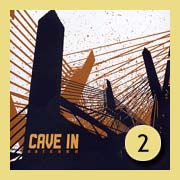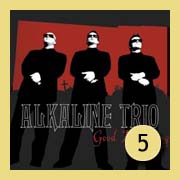
In fact, as much as I like this music, I find it to be overall uninspiring. It took me half a year to realize that I was never going to finish writing about all of them, because I just didn't have that much to say. They're fun to listen to. Listen to them.
 Motion City Soundtrack / I Am the Movie
Motion City Soundtrack / I Am the Movie
Epitaph
I Am the Movie is 2003's best record of 2002. Motion City Soundtrack self-released the original version of the record last year, hand-packaging each CD in an old, hollowed-out 5" floppy diskette. Thanks to constant touring and a network of indie rock websites, the band developed a dedicated following and landed a surprise deal with hardcore punk label Epitaph. What doesn't fit is that Motion City Soundtrack is one of the poppiest bands you're likely to hear on the indie circuit. If the Get Up Kids (circa 1999) and Ozma (circa 2000) collaborated on a side-project, etc. This is not your typical SoCal ska-punk-speed act.
The opener, "Cambridge," is a little weak but it leads into a serious of rave-ups that have to be heard -- preferably live -- to be believed. "Shiver" and "The Future Freaks Me Out" are each among the best tracks of the year, lead single "My Favorite Accident" and "The Red Dress" give vocalist Joshua Cain a chance to stretch a little (and again, will get any crowd going), while "Capital H" puts to shame every use of keyboards in indie pop since the first Rentals album.
I've been listening to this album for over a year and it's still as compelling as it was the time I played it. I saw the band live twice this year, and both shows were home runs, despite the terrible sound engineering the first time around. If they continue turning out top pop like I Am the Movie and touring as hard as they have been, this band still has a long rise ahead of them.
 Cave In / Antenna
Cave In / Antenna
RCA
Cave In was one of a number of indie bands to make the major label jump in 2003. Two more -- Thursday and the Juliana Theory -- are elsewhere on this list, and others such as the Ataris and AFI have made big mainstream splashes. The standard claim is that jumping to a major label destroys a band's art, and that claim has been applied to all these bands. In Cave In's case, I think it's just the opposite. Antenna is the best album of their career.
Taking another step out from the sound they achieved on 2000's Jupiter, the band creates a pop-friendly sound based on the hardcore style pioneered by the likes of Failure and Jawbox. "Inspire," "Joy Opposites," "Rubber and Glue" and "Lost in the Air" are all among the best songs of the year and more than make up for the back-to-back downturn of "Beautiful Son" and "Seafrost." I don't know why they haven't broken through to modern rock radio -- perhaps we've decided that Linkin Park is as close as we want to get to art rock -- but I sure hope their upcoming follow-up does it. This is one of the few major label rock bands still putting out important music.
 Rainer Maria / Long Knives Drawn
Rainer Maria / Long Knives Drawn
Polyvinyl
I wasn't really expecting something so hard-sounding from Rainer Maria, and I suspect that I'd've been pessimistic if I'd known ahead of time that that's what Long Knives Drawn would be. So, I'm a little surprised that my only complaint about this album is its short length. After these nine tracks, I want more.
"Emo" is probably a useless term anymore, but it's particularly applicable to this band and this record. The unique quality of Caithlin de Marrais's voice conveys a sense of emotional hunger no matter what she's singing, from the cynical glee of "Mystery and Misery," to the harsh anger of "Long Knives," to the sweet resignation of "Situation: Relation." Every word she sings sounds beautiful, even if it's not. It's amazing to listen to something like this in a culture caught up in the stylistic miming of American Idol -- how can people be so drawn in by heartless bombast when they could be listening to this?
 The Postal Service / Give Up
The Postal Service / Give Up
Sub Pop
The marriage of indie rock and DIY IDM (that's Do-It-Yourself Intelligent-Dance-Music) has probably been inevitable since Billy Corgan started mixing down Adore. The much greater availability of computerized music tools has led to an explosion in indie electronica, which has in turn led to opportunities for folks like Dntel (aka Jimmy Tamborello) and Ben Gibbard (aka the frontman of Death Cab For Cutie) to collaborate. After a one-off collaboration on Dntel's Life Is Full of Possibilities, they got together for a full-length album as the Postal Service, which turned out to dwarf anything either of them had done before.
Playing up Gibbard's role a bit, and thus inflecting a more traditional pop structure, the duo create something that isn't altogether different from the more fey aspects of new wave (think more Pet Shop Boys than New Order) but is by no means the same. "Clark Gable" is probably where the mid-80's Britwhimsy hits its peak, but even as a non-fan of most new wave music, I like what it does.
 Alkaline Trio / Good Mourning
Alkaline Trio / Good Mourning
Vagrant
None of the previous Alkaline Trio records clicked with me. Good Mourning clicked all summer long; the first four tracks, in particular, comprise of the most listenable blocks of modern rock to come out in ages. Predictably, the indie community appears to have now written them off, because their current material doesn't quite mimic their old material.
 Year of the Rabbit / Year of the Rabbit
Year of the Rabbit / Year of the Rabbit
Elektra
I don't expect there to ever be a second Year of the Rabbit record. Ken Andrews's previous Failure follow-up, On, had only one real record before being turned into a solo, self-release project. YotR didn't catch fire with anybody but me, and that's not what Elektra wants. Hopefully Andrews will get the business side of things right with whatever follows this, whether it's more YotR material or not. I like his production work, but I like his songwriting more. In a perfect world, his slick hooks and warbly feedback would be deried as too commercial.
 The Long Winters / When I Pretend to Fall
The Long Winters / When I Pretend to Fall
Barsuk
Wait, isn't that supposed to say "New Pornographers?" I mean, that's who made the indie power-pop record of the year, right? I thought so, too, until I realized that only a couple songs from Electric Version were sticking with me. Meanwhile, When I Pretend to Fall was gradually seeping into my consciousness. While their first record only caught my notice because of the band's connection to Harvey Danger, I found myself humming this one constantly.
The Long Winters' full-bodied, rootsy sound implies something like what the Promise Ring might've been doing this year had they not gone their separate ways. A comparison to certain parts of the Built to Spill catalog would not be unwarranted, and is not surprising given the band's northwest origin. The opening trio of "Blue Diamonds," "Scared Straight" and the tremendous "Shapes" stakes the record's claim to the pop mountain.
 The Jealous Sound / Kill Them With Kindness
The Jealous Sound / Kill Them With Kindness
Better Looking
Dancepunk. Garage rock revival. IDM. The indie community is very fond of trendspotting and subsequently pigeonholing musicians. I am glad that indie musicians, for the most part, are not. What the Jealous Sound have produced (several years late, mind) is an album full of wonderful, crisp rock music that defies fashion and forces you to confront on its own high merits. When you listen to it, try to imagine all those early 80's guitar auteurs (e.g. Tommy Tutone, Rick Springfield) coming of age in the mid-90's, then think again about what you're hearing.
 Mates of State / Team Boo
Mates of State / Team Boo
Polyvinyl
There's not enough exuberant pop being made well and sold successfully in the indie world. I think Mates of State may have figured out the secret to doing so -- lots of organ melodies and a female singer with a big, bright voice. This record does a better job of getting the point across than did 2002's Our Constant Concern, and the duo seem to have scaled back their attempt to sound like a bigger band in the studio. See them live if you get the chance; you'll love it.
 Rx Bandits / The Resignation
Rx Bandits / The Resignation
Drive-thru/Geffen
Rx Bandits are the closest thing we have these days to the Clash, and I say that as somebody who appreciates but doesn't particularly like the Clash. Their similarities are thematic as well as musical, and with The Resignation, they've gotten even closer.
The politics and affinity for ska and dub are the obvious connections, but look also at how they stand out from their contemporaries. The Clash provided the substance that the Sex Pistols and Ramones lacked. Rx Bandits share a label with the likes of New Found Glory and Something Corporate. They're the new conscience of serious rock, with musicianship that's miles beyond the folks they're appearing on stages with.
 Thursday / War All the Time
Thursday / War All the Time
Island
Everything has changed. That's what we told ourselves and that's what we made true. On a morning in September, 3,000 people died in New York -- people who presumably would have otherwise died another day. At the same time, and throughout 2001, people were dying of various diseases, in car crashes, from gun crime, in much larger numbers. Our conception of the event has always been greater than its facts. We are terrible at caring about people and superb at caring about circumstances.
The unavoidable outcome of our obsession is that we cannot evaluate new art without placing it in expressive, group therapy context of that obsession. Thursday's War All the Time is a product of its era, and it can't avoid prejudicing its listeners with song titles like "This Song Brought to You By a Falling Bomb" and "For the Workforce, Drowning."
It's probably about time we stopped playing around with imagery and metaphor, but as long as we're still afraid to be blunt, we could do worse than this record.
 The Juliana Theory / Love
The Juliana Theory / Love
Epic
Evanescence / Fallen
Wind-up
What is Christian rock? Jars of Clay play rock music about being Christian, but despite a moment of mainstream fame in the mid-90's, they've basically given up on crossing over. Did Creed play Christian rock? Does U2?
I've never made a secret of my distaste for the Christian entertainment industry, both from a content standpoint -- I really don't need Corbin Bernsen to try to save my soul by defending the last Christian before the Evil Supreme Court -- and from a tactical consumer standpoint -- that churches buy out theatres playing "Christian" movies in order to crack the box office top ten is kind of gross. And yet, the Juliana Theory and Evanescence are both supposedly Christian bands, which I guess means something more than that they're a band made up of Christian people.
As far as the Juliana Theory goes, I've never heard any evidence in their music that they're especially Christian. Their second album, 2000's Emotion Is Dead, was a brilliant hardcore record that modernized the too mature to be angry but too young to be content sound of early Fugazi in a way that absolutely would've caught fire had they been on a major label at the time, but if it was discontent at the state of modern Christianity, there was nothing in the lyrics to betray it. Love doesn't do it either, but it also doesn't come out with guns blazing like Emotion did.
To be honest, I was really disappointed with this album a year ago. I almost passed over the new Cave In album because I felt so burned over this major label debut. They sound so reined in, especially on the remake of Emotion's "Into the Dark," that I can't imagine why Epic signed them in the first place. If they wanted the unencumbered bombast of their indie work, why sedate them for this record (and then decide to drop them later in the year)? Now that I've had some time with it, though, the album has grown on me quite a bit.
The entire album is a little too polished for my taste, but tracks such as "Congratulations," "Repeating, Repeating" and "In Conversation" tap the same hard energy that overflowed from Emotion Is Dead. It's unfortunate that they seem to have overstrategized the major label game (either on their own or at Epic's direction) but there's still a lot of good material here, and I hope that whatever comes next is able to build on that.
Meanwhile, Evanescence, not quite on a real major label, has put out the radio rock album of the year. Deftly grafting Tori-goth onto Linkin-riffs, the band creates the perfect atmosphere for songs questioning aspects of religion, which is really what this whole thing is about. Christian record stores reportedly stopped carrying this album when members of the band used naughty words in a Rolling Stone interview, but if they actually listened to it, they probably wouldn't have carried it in the first place. "Bring Me to Life," the smash single that launched Fallen into its permanent perch in the Billboard top ten, is about singer Amy Lee losing her faith.
It doesn't stop there. The entire album is about questioning central tenets of Christianity, and I don't mean things like "Judge not lest ye be judged," I'm talking about the essential infrastructure of the faith. My favorite track is "Everybody's Fool," which is probably also the most explicit in the concepts it addresses. The chorus, ending with "and you think you've got everybody fooled," is sung with such terrified disappointment that it almost makes me want to believe. The fresh wound of questioned faith can be unbearable until it scabs over and sometimes you need to put a microphone in front of the scream.
 Everclear / Slow Motion Daydream
Everclear / Slow Motion Daydream
Capitol
Here's what I suspect is happening. Somebody at Capitol, for whatever reason, continues to let Art Alexakis decide what Everclear tracks will be released as singles, and he keeps picking junk because he's obsessed with appearing clever. It happened with the release of the ridiculous "AM Radio" in 2000, and it happened last year when radio stations were given "Volvo Driving Soccer Mom" in advance of Slow Motion Daydream. While amusing the first few times, it's by far the weakest track on the album and a forgettable point in Everclear's catalog.
As brazenly political an album as this is, I'd have probably lead off with "Blackjack," an angry screed against John Ashcroft, which is a brash enough tune to re-establish the band in the hardcore milieu. If they wanted to wait to piss off the right-wingers, they could've gone with "I Want to Die a Beautiful Death." If they wanted to send a middle finger in the general direction of Nashville, they could've gone with "The New York Times," far and away the most interesting, most thoughtful and most human song I've heard about the Day Everything Changed.
The bonus DVD that comes with the album holds some insight into the odd selection. Alexakis talks about trying to create a cohesive document, and it really comes together like that. Each track mixes into the next, something of an old school idea in the age of iTunes. I guess it's time for Everclear to start their long fade into nothingness, but if this is what they're going to produce, I don't really mind if I'm the only one still paying attention.
 Fountains of Wayne / Welcome Interstate Managers
Fountains of Wayne / Welcome Interstate Managers
S-Curve
Wait, isn't that supposed to say-- OK, I already did that one. But in this case, I really am surprised that Fountains of Wayne wound up on this list but New Pornographers didn't. I didn't pay much close attention to Welcome Interstate Managers when it came out last June, preferring to ponder Radiohead and complain about Liz Phair. Plus, I tended to tune out everytime the record got to "Stacy's Mom" -- the hit single and a singularly annoying song.
But then, over the months, several of these songs locked themselves into my brain. "Bright Future in Sales," "Hackensack," "Little Red Light" and "Fire Island" are all terrifically catchy, and "No Better Place" is probably the best Matthew Sweet homage anyone will ever record. The album is a little long -- everything after "Fire Island" could probably be relegated to b-sides -- but it's hard to begrudge a band putting out a 16-track record after a four-year hiatus. This isn't going to change the world, but it can make the world a little happier for an hour.
Posted by Aaron S. Veenstra ::: 2004:06:29:15:07